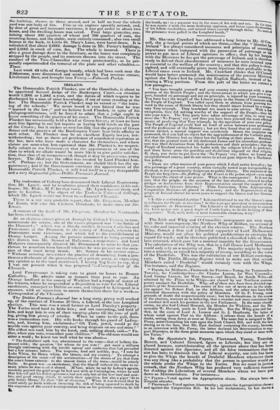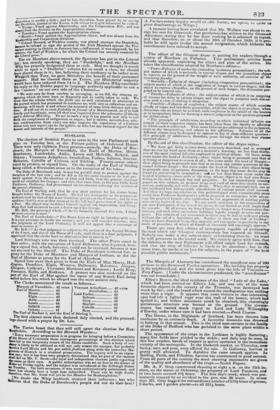The Irish and Whig and O'Connellite newspapers are very angry
with their contemporary, the Northern Whig of Belfast, on account of Ii s calm and impartial sertitiny of the election returns. The _Northern Whig, though a firm and iiitlitential supporter of Lord Melbourne's
Ministry, would not allow his political predilections to overcome his regard for truth ; and he therefore published a classified table of Alem. hers returned, which gave but u nominal majority for the Govertintent. The calculation of the was, that in it full House Lord Melbourne
could only rely on a majority of four. This majority might be turned into a minority, or raised to ma majority of twenty, according to the votes of the Doubt lids. This was the calculation of our Belfast contempo. rary. The Dublin Morning Register tried to make out that several Members called " Doubtful" would certainly vote with the Whigs. For instance, said the Register, " Poyntz, for Millburst—Fleetwood, for Preston—Young, for Tynemouth- Townley, for Cambridgeshire—Sir Charles Lemon, for West Cornwall—
Lord George Lennox, for West Sussex—and Benett, for South M'ilts—all
admitted by the Times to be Whigs—are classed by our Northern contem- porary amongst the Doubtful,. Why, all of these men have been decided sup- porters of the Government. The names of five out of seven are in the map.
'icy against Sir Robert l'eel, on the Address, and the other two have fully identified themselves with the policy of Ministers. Of G. F. Young, some grounds of doubt did unquestionably exist ; but his declarations, in the course of the election, warrant us in believing, that a steadier and more consistent fine of conduct will mark his position in the new Parlianient. In the same class& cation, we also find Colonel Howard, the Member for Wicklow, and the Hie nourable W. Howard, uncle to Lord Morpeth. But the Whig goes still fur titer, in the cases of Lord A. Lennox and G. J. Heathcote, the latter of whom voted against Peel on the Address: it refuses them the benefit of a doubt, setting them down at once as Tories. The same fate is assigned to Mr. Posey, notwithstanding his vote upon the Irish Church Bill, and with the fact staring us in the face, that Mr. East declined contesting the county, because, in an interview with Mr. Pusey, the latter declared his determination to sup- port Ministers, in the three great measures upon which they stand at issue with the Tories."
In the Spectator's list, Poyntz, Fleetwood, Young, Townley, Benett, and Colonel Howard, figure as Liberals; but they are so
placed because, notwithstanding all the ignorant abuse that has been
directed against the Spectator, and all the false insinuations that its aim has been to diminish the fair Liberal majority, our rule has been
to give the Whigs the benefit of Doubtful Members whenever there was any thing like a probability that the person in question would on the whole prefer the Whigs to the Tories. But we must in justice
remark, that the Northern 'Whig has produced very sufficient reasons for doubting the Liberalism of several Members whom we have put down as Alinisterialists. For instance- Poyntz—Voted against the Appropriation clause. Has always been az irregular attender. " Fleetwood—Voted against Abercromby ; against the Appropriation clause: and against the Corporation Bill. In his lute declarations, he has sheen a di position to modify a little; and be has, therefore, been placed by us among eh' Doubtfuls, instead of the Tories, with whom he might otherwise be ranked. t young—Voted against Abercromby, and the Corporation Bill ; and was absent front the division on the Appropriation clause. " Townley—Voted against the Appropriation clause. 41 Benett—Voted against the Appropriation claine, and was absent from the Speakership and Corporation divisions. Colonel Howard, of Wicklow county, was placed amongst the Doubtful*, because he refused to sign the protest of the Irish Members against the Pro- %smut meeting in Dublin in January last,—influenced, it was supposed, by his triatiee, the Earl of Wicklow ; for which the Colonel was severely censured by
the Liberal press."
The six Members above-named, the Spectator has put in the Liberal list; but, strictly speaking, they are Doubtfuls," and the Northern whig has properly designated them as such. Had we thought it worth while to open a "Doubtful" column for so small a class, we should have placed them in it ; but, believing their tendency to be rather more Whiggish than Tory, we gave Ministers the benefit of their presumed support. Had we classed them as Tories, our Ministerial majority would have been reduced from 14 to 2. The Northern Whig concludes
i
his reply to the Dublin paper n language perfectly applicable to not a
few "ranters" on our own side of the Channel-
" We were very far from careless in arranging, as we did, the returns, re- specting which we have been so flippantly and so rashly taken to task. We trust that the rebuke which the facts are so well calculated to administer to the journal which has presumed to condemn us, with airs so ridiculous and un- becoming, will teach it and others the necessity of some little delicacy and cau- tion. It will not do to rant foolishly in favour of a Government, as if to talk loosely and boasting!'.', were all that was required from the advocates of liberty end a Liberal Ministry: To art in such a way is too puerile and silly to call forth the compliment ot indignation or anger ; but it merits, nevertheless, salu- tary condemnation from every one who respects the reputation of a Cabinet whose only sure report can be the public, or who has any rational regard for the honour and interests of the people."



























 Previous page
Previous page